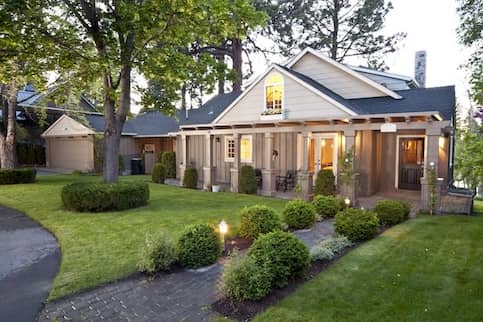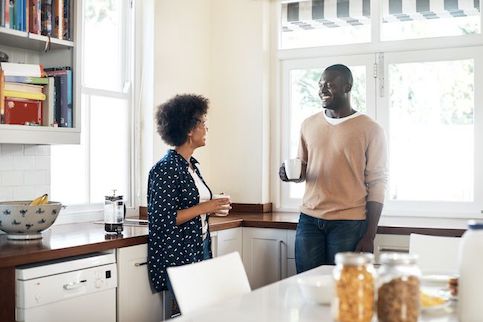Effective Nov. 16, 2025, both Fannie Mae and Freddie Mac no longer require a specific minimum credit score for conventional loan approval. Instead, loan decisions will be based on an analysis of overall credit risk factors.
A second home could serve as a vacation spot, a place for your kids to live while attending college or an investment. Let’s review how to buy a second house and what you need to know about owning one.
Why Buy A Second Home?
Buying a second home might get you closer to people you love and places you enjoy, or it may be something that helps you meet your financial goals. With online apps making it easy to set up short-term rentals, many second homes can serve as both a family vacation spot and a source of income.
Here are some of the most common reasons for buying a second home:
- To use as a vacation home: If you and your family love the mountains but live in the city, you might be able to spend more time getting away if you own a vacation house in a place you love.
- A way to diversify assets: Homes tend to appreciate in value, so you can use your second home to diversify your investments. Investing some retirement savings in real estate means that a portion of your portfolio won’t be subject to the whims of the stock market. However, there are risks and costs associated with owning real estate as an investment. And property values can fluctuate as can stock values. You’ll need to weigh the pros against the cons, and you may want to consider other assets if you’re looking for diversification.
- A source of rental income: Though a second home is your part-time residence, you can rent it out on occasion for extra income.
- A place to retire: If you plan to move in retirement, you can get a head start on creating a community in a place you love by purchasing a second home. The home can be a retreat for now and a place to live full time later.
- Potential tax breaks: You can deduct property taxes and mortgage interest on your second home when you do your taxes. If you use the home as a rental property, the IRS allows you to take certain tax deductions, which could offset your costs.
- House a family member: You may want to buy a house for a family member, whether it’s an aging parent or a child attending college.
What’s Your Goal?
Buy A Home
Discover mortgage options that fit your unique financial needs.

Refinance
Refinance your mortgage to have more money for what matters.
Tap Into Equity
Use your home’s equity and unlock cash to achieve your goals.
Can You Afford A Second Home?
While there are benefits to buying a second home, you need to be sure you can afford it. Consider the following expenses that come with a second home:
- Another mortgage: You may be looking at two home loan payments each month.
- A down payment: To buy a second home, you generally need at least a 10% down payment on a conventional loan and at least 20% on a jumbo loan.
- Utilities: You’ll need to pay for these year-round, even when you’re not using the home.
- Insurance: This is a requirement for having a mortgage. The cost of homeowners insurance will vary depending on your home’s size and location.
- Maintenance: You’ll be responsible for all routine maintenance, which could cost 1% – 4% of your second home’s value.
- Property taxes: The amount you pay will depend on the value of the home and the tax rate where the house is located, and it could go up over time.
Ready To Become A Homeowner?
Get matched with a lender that can help you find the right mortgage.
Mortgage Requirements For A Second Home
Lenders generally consider a home loan for a second home riskier than a primary mortgage. For this reason, you’ll typically need a larger minimum down payment – 10% for a conventional loan, as opposed to just 3% for a primary home loan. You’ll also need a credit score of at least 620 for a conventional loan and should aim for a debt-to-income ratio no higher than 36%.
In addition to stricter eligibility requirements, you may have fewer options for a home loan for a second home. Conventional and jumbo loans are the two most common types of loans for buying a second home. With few exceptions, FHA, VA and USDA loans can be used to purchase primary homes only.
How To Buy A Second House
If you’re wondering how to buy a second house, know that it can be similar to buying your first home. Here’s what the process looks like.
1. Determine Your Goals For A Second Home
It’s important to figure out what you want to use your second home for. If it’s a vacation property, make sure it’s in a location you like but is also accessible from where you live. A vacation home you can’t get to won’t do you much good.
If you want to use your second home as an investment property, make sure the area lends to that purpose. You may want to focus on areas where temporary housing tends to be in demand, like college and beach towns.
2. See What You Can Afford
Unless your primary home is paid off, you may be looking at having to pay two mortgages if you buy a second home. Review your expenses to see what payments you can afford when accounting for both properties.
Remember to factor in property taxes, insurance and maintenance. Also consider the up-front costs of buying a second house, like a down payment, closing costs and furnishing the home.
3. Compare Mortgage Lenders And Get Preapproved
Unless you can afford to buy your second house with cash, you’ll need a home loan for a second home. You can start by getting preapproved for a mortgage.
A preapproval letter states how much a lender is willing to loan you. While it’s not a guaranteed loan offer, it gives you an idea of how much house you can afford and shows sellers you should be able to get financing.
4. Look For A Second Home And Make An Offer
A reputable real estate agent can help you make a well-informed purchase. Once you find an agent, start touring homes and attending open houses. Your real estate agent can help you find listings that match your criteria and priorities. Once you’ve found a home to buy, your agent can help you put together an offer.
5. Apply For Your Mortgage
Once you make an offer that’s accepted, you’ll be ready to apply for a mortgage. You’ll need to provide your lender with financial information that they’ll verify, including tax returns, pay stubs and other documents proving employment and funds.
6. Close On Your Second-Home Mortgage
Once your home loan for a second home is approved, you’ll start the closing process. You’ll schedule a home inspection to get a thorough report detailing the home’s condition. You’ll also get an appraisal, which will tell you the market value of the home.
You’ll also need to buy homeowners insurance and title insurance. Once you’ve completed a final walk-through, you’ll sign all of the paperwork and pay your closing costs to make your second-home purchase official.
Take The First Step To Buying A Home
Find a lender that will work with your unique financial situation.
FAQ About Buying A Second Home
Here are the answers to some frequently asked questions on how to buy a second house.
The Bottom Line
Buying a second home can be a rewarding decision, whether you plan to enjoy it yourself as a vacation home, rent it out or do a little of both. Just make sure you can afford the up-front and ongoing costs involved, and familiarize yourself with how to buy a second house so there are no surprises along the way.

Maurie Backman
Maurie Backman has more than a decade of experience covering personal finance topics that include mortgages, loans, retirement, Social Security, and investing. Prior to becoming a full-time writer, she worked in the financial industry as well as in product design and marketing. Maurie holds a bachelor's degree from Binghamton University, where she studied creative writing and finance. She was happy to combine her two areas of study into a career that allows her to educate consumers on a host of financial topics.












